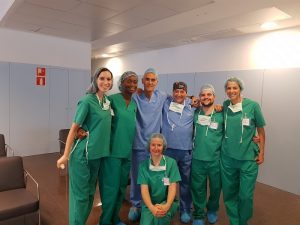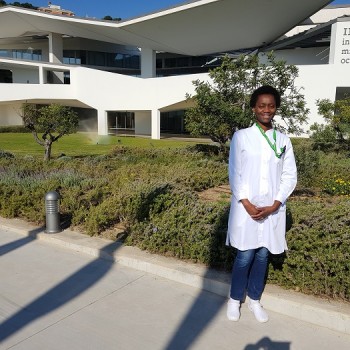Tapuwa Gundana, born in Maputo (Mozambique), is currently performing her medical residence specialized in Ophthalmology at the Maputo Central Hospital. Honoring its commitment with Eyes of the world to train local professionals, Dr. Gundana has done an internship of four months in the Ocular Microsurgery Institute (OMI), thanks to the financing of the Gulbenkian Foundation. Particularly in the healthcare units of the center, both in medical consultation and complementary tests and operating room. After such internship, the doctor came back to Mozambique for the purpose of finishing her studies and, this way, become an ophthalmologist.
Why did you decide to specialize in ophthalmology? What are your goals and professional challenges?
During my sixth year of education, I felt overwhelmed seeing the satisfaction of the patients after they could restore their vision in the cataracts postoperative period. Also, as I like to help people, I saw in this specialization a chance to be able to help through my commitment and determination.
My main goal is to provide basic ocular health care to the general population, especially the most vulnerable. And, professionally, I aim to become a skilled ophthalmologist who can achieve to deliver the best of herself with quality.
What are the challenges that you face as a future professional in Mozambique? Do you feel that the place where you have been born has limited your professional aspirations?
As a future professional, in my country I must face the lack of equipment in public hospitals, lack of medicines and surgical tools. To continue my education, I face the lack of qualified professionals that could offer me a sub specialization.
On the other hand, the place where I was born has not limited my career aspirations, despite the impossibility of carrying out a sub specialization here, I do have had the chance to leave the country in order to be able to specialize myself.
 What are the main ophthalmological problems in Mozambique and how is the access for the population to ocular health? What are the barriers to overcome?
What are the main ophthalmological problems in Mozambique and how is the access for the population to ocular health? What are the barriers to overcome?
I consider that the main ophthalmologic problems in Mozambique are the lack of specialists in ophthalmology and therefore the existence of rural hospitals without ophthalmologists; the lack of anti-glaucomatous medicines in public hospitals and the lack of good surgical tools. Also the difficult access of the population to eye health and the deficit caused by the lack of ophthalmologists, since the few professionals that there are, are concentrated in the capital.
The barriers to overcome are the increase of the scarce number of ophthalmologists to achieve the coverage of most of the resident population in the remote areas, start to think about the sub specializations and equip central and rural hospitals for the development of the ophthalmologic activities.
Do you consider that Mozambique does not promote thought and awareness regarding eye health?
What happens in Mozambique is that there are multiple health areas with information deficiencies, as well as lack of funds. What must be done is to continue with dialogue and to show that ophthalmology is as important as the rest of the areas. This for instance, the number of patients seen and operated annually in the ophthalmologic services must be exposed.
What do you think that can be done to improve the ophthalmic attention in Mozambique?
Firstly, show with real data the impact of ophthalmologic illnesses related to old age that the majority of persons suffer in the country. In addition to this, it must be taken into account that if other illnesses are being detected at an early stage, blindness and work absence could be avoided.
Likewise, it should be evidenced the need of making available more resources allocated for ophthalmology, human as well as physical, as well as equipping health units.
With those measures, it will be brought to the attention the need to invest more in this medical specialization, and so be able to improve the quality of attention of the most vulnerable part of the population.
How would you define the situation of women in your country?
The situation of women in Mozambique has quite improved. Nowadays the number of women entrepreneurs has increased, each on its level. In fact, in general, the number of women having leadership positions in professional areas mainly crowded by men has increased in those last years.
What do you think are the main barriers that prevent women to access eye health? What are the solutions you would propose to revert this situation?
One of the main barriers that prevent women to access eye healthcare are the ones related to the distance between the health units and its households, which is very common in rural areas. In relation to women coming from those areas, it should be also mentioned the lack of awareness of the handling and care of certain ocular illnesses.
In order to improve the scenario I propose the implementation of talks in neighborhoods and awareness campaigns, in addition to continue displacing doctors, a few times each month, towards rural areas to satisfy the needs of those populations that are not able to displace themselves because they do not have the necessary economical resources.
At a professional and personal level, what does represent for you the possibility to continue with your education in Spain? What were the knowledge areas you had planned to expand? What aspects of your training seem to you the most remarkable?
To me, it represents the certainty of being able to rely on quality training where, at the same time, it allows me to address a different approach when it comes to the treatment of ocular illnesses.
With such education, I aim to expand my practical knowledge in the lab and consolidate the theoretical knowledge obtained until that moment. And the most remarkable aspects to underline are the possibility of undertaking an internship at the lab, as well as being able to observe the technique and the most advance diagnosis procedures in ophthalmology.
Once you finalize your academic stay, how do you think you will be able to apply and adapt what you have learnt in Mozambique?
I will be able to provide a better quality of diagnosis and treatment, more specialized in the most common ocular illnesses in Mozambique, according to the patient’s needs.
Finally, how do you value the support of the Eyes of the world Foundation? And what are the three words that you believe define the foundation?
I value the support the Foundation has provided to my education in a positive way by offering me the opportunity to make an academic stay at one of the best ophthalmologic centers in Spain and in Europe. With it, I have been able to have the chance to refine my knowledge and surgical abilities as well as learn about the most advance diagnosis techniques and treatments to improve the treatment to patients with ophthalmologic needs.
The three words I define Eyes of the world are vision, formation and humanization.
